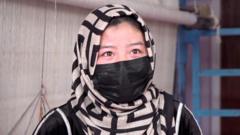In a country where the Taliban's rule has stifled educational opportunities for girls, many are turning to carpet weaving to support themselves and their families.
Afghan Girls Resilient Amidst School Ban Turn to Carpet Weaving

Afghan Girls Resilient Amidst School Ban Turn to Carpet Weaving
Desperate times lead Afghan girls to embrace carpet weaving as a means of survival after education is denied.
In a workshop tucked away within Kabul, the sound of weaving looms fills the air as hundreds of women and girls labor tirelessly in cramped quarters, seeking a semblance of stability in their lives. Among them is 19-year-old Salehe Hassani, who reflects sorrowfully on the education she once pursued, now stripped away by the Taliban’s policies. "We girls no longer have the chance to study," she laments, smiling sadly.
Since the Taliban regained control in 2021, girls over the age of 12 have been barred from education, leading many to turn to laborious occupations such as carpet weaving, one of the few fields still accessible to women. This drastic regulatory shift has exacerbated an already dire economic situation, leading to a workforce comprised of approximately 1.2 to 1.5 million Afghans reliant on the carpet industry, with women constituting about 90% of this number, as reported by the UN.
Despite the booming carpet export market—which saw over 2.4 million kilograms valued at $8.7 million exported in the first half of 2024—workers often find themselves trapped in abysmally low-wage situations. While carpets fetch high prices abroad, local weavers are typically compensated around $27 for a square meter—an amount that can take a month to produce—leaving them with less than a dollar a day even after grueling 10 to 12 hour shifts.
Businessman Nisar Ahmad Hassieni, who operates multiple workshops, acknowledges the heavy burden on workers while advocating for better conditions, though wages remain insufficient. He mentions, "We established three workshops for carpet weaving and wool spinning" as a means to uplift those left behind by the closures.
The Taliban have reiterated that girls may return to school once certain educational conditions are met, yet no tangible progress has taken place. In the impoverished Dasht-e Barchi area of Kabul, Shakila, 22, who once dreamed of becoming a lawyer, now oversees her family's carpet weaving to help support them after her education was disrupted by the Taliban's return to power. The trauma from past violence at her school still haunts her, urging them all to work rather than study.
Shakila’s sister, Samira, dreams of becoming a journalist, yet after experiencing a deadly attack at the school, her ambitions have been postponed, stricken by fear and traumatic memories. Nonetheless, she holds on to the hope of returning to school, believing, "Now that the Taliban are in power, the security situation has improved."
Amidst this environment of despair, the determination of these young women shines through. Salehe, for instance, continues to pursue her education independently—studying English in hopes of one day becoming a doctor and contributing significantly to her nation’s future. Her dreams serve as a testament to the resilient spirit of Afghan girls, revealing that, despite overwhelming adversity, their aspirations remain unquenchable.






















